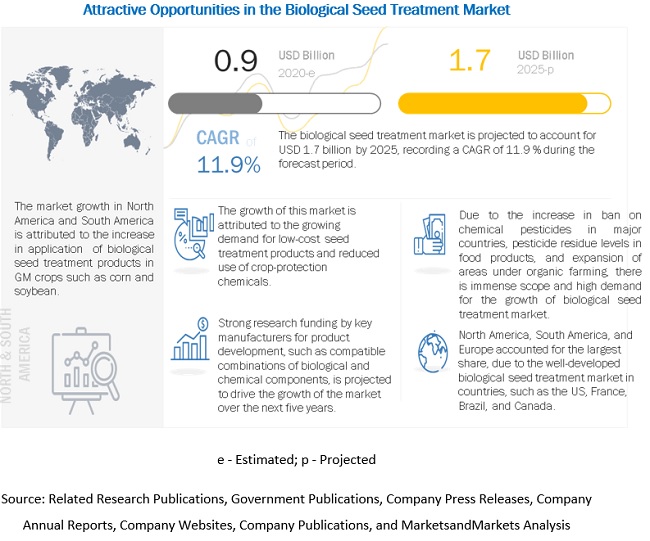The report “Biological Seed Treatment Market by Type (Microbials and Botanicals), Crop (Corn, Wheat, Soybean, Cotton, Sunflower, and Vegetable Crops), Function (Seed Protection and Seed Enhancement), and Region – Global Forecast to 2025″, is projected to reach USD 1.7 billion by 2025, from USD 0.9 billion in 2020, at a CAGR of 11.9% during the forecast period. The market is driven by factors such as high demand for sustainable agriculture in the global market, lesser risks of exceeding pesticide MRLs, and insurance to seed investments.

COVID-19 impact on Seed Treatment market
The biological seed treatment market includes major Tier I and II suppliers like BASF SE (Germany), Bayer AG (Germany), Novozymes A/S (Denmark), Syngenta Group (Switzerland) and Corteva Agriscience (US). These suppliers have their manufacturing facilities spread across various countries across Asia Pacific, Europe, North America, South America, and RoW. As a result of the COVID-19 pandemic, there had been a supply chain disruption, due to which the agricultural sector had to face problems, such as labor unavailability, transportation barriers, restriction for market access, and the lack of inventories in some regions. Many manufacturers were facing issues due to the lack of raw material availability, which led to the reduction of seed treatment product manufacturing that includes biological seed treatment products. Post COVID-19, the agricultural activities have normalized, which has helped the companies to deliver products to the required places. Similar to the other biological agricultural product, seed treatment product also plays an important role, as it has been able to serve as an important solution for farmers across the globe.
Download PDF Brochure: https://www.marketsandmarkets.com/pdfdownloadNew.asp?id=162422288
Restraints: Government regulatory barriers
The regulatory environment for active biological ingredients differs between countries and regions. Generally, authorities around the world recognize that biological seed treatment products are beneficial but different from chemical plant protection products. Moreover, this recognition has not necessarily led to consistent approaches in regulatory requirements or review processes. In some countries, biologicals are registered under specific legislation or they may be registered in a similar manner as chemical plant protection products. At times, there are reduced data requirements, and other times there may be no well-defined process at all for their registration.
Challenges: Inconsistent performance and incompatibility with certain pesticides
The features of biological seed treatments that have discouraged investment are their inconsistent results. The most common problems encountered during the usage of such products include desiccation and environmental conditions that discourage their growth. Successful inoculants with one crop may not work as effectively with another crop. For instance, Trichoderma is more effective for the increase in yield in tomatoes than cucumbers. Choosing just one or two microbes is not as effective as loading with an entire community. However, effectiveness can sometimes be increased by a combination of microbes, with various growth requirements. For instance, fungi can be combined with PGPR.
Make an Inquiry: https://www.marketsandmarkets.com/Enquiry_Before_BuyingNew.asp?id=162422288
North America is projected to be the fastest-growing market
The major reason for the biological seed treatment market experiencing such a high growth rate is the highly streamlined product registration process, which makes it easier for most private companies to launch their products easily. Lower investment requirement and limited gestation period involved in the development and commercialization of biological products are key factors attracting a large number of startup companies in the industry. Additionally, growing awareness among consumers against synthetic chemicals has also led to a higher adoption of these products.
This report includes a study of marketing and development strategies, along with the product portfolios of leading companies. It also includes the profiles of leading companies such as BASF SE (Germany), Bayer AG (Germany), Syngenta Group(Switzerland), Corteva Agriscience (US), Valent BioSciences (US), Verdesian Life Sciences (US), Plant Health Care (US), Precision Laboratories (US), Koppert Biological Systems (Netherlands), Italpollina (Italy), Marrone Bio Innovation (US), Certis Europe (Netherlands), UPL Limited (India), Novozymes A/S (Denmark), IPL Biologicals (India), Rizobacter (Argentina), Bioworks, Inc (US), Advanced Biological Marketing (US), Kan Biosys (India), and Incotec (Netherlands).

